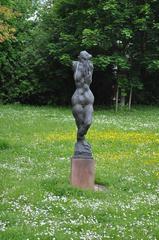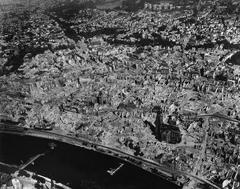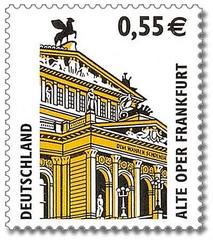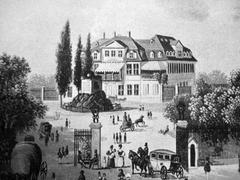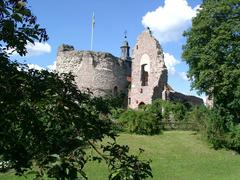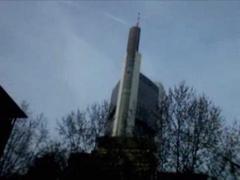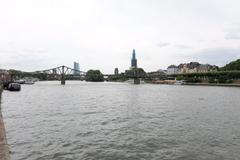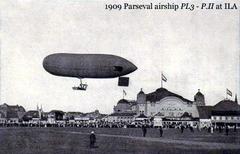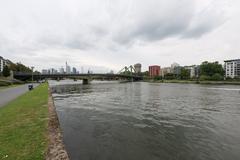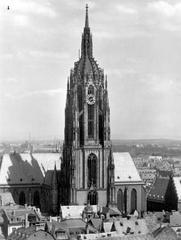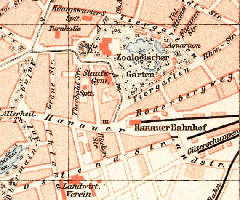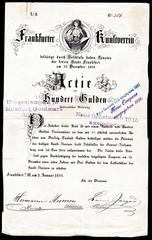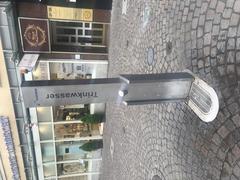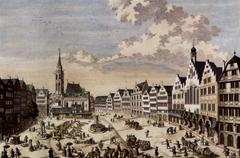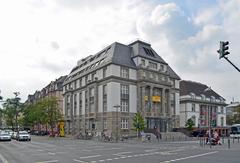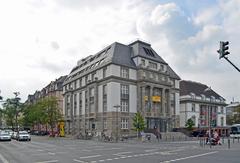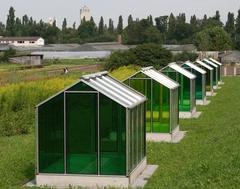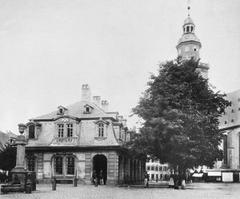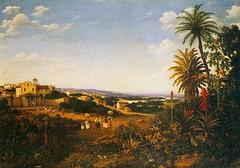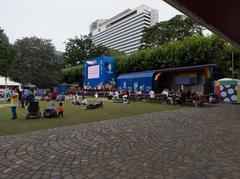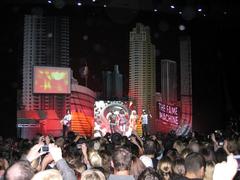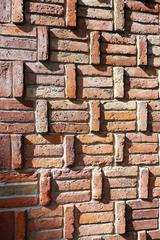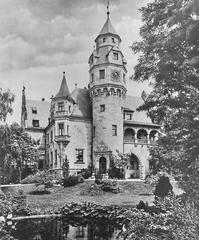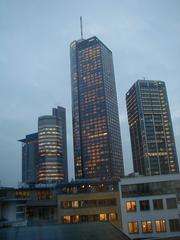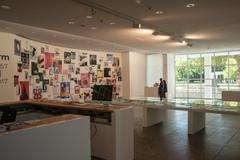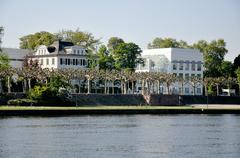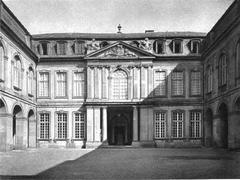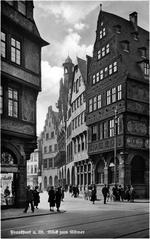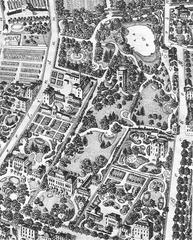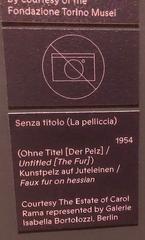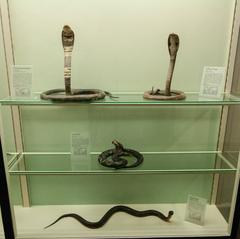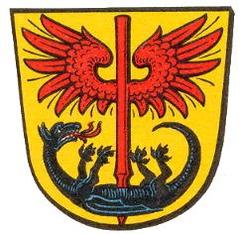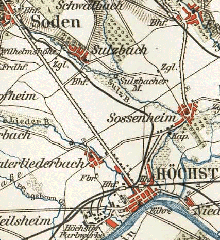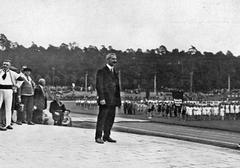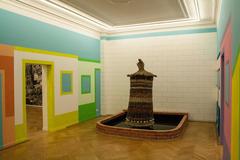Institute for the History of Frankfurt: Visiting Hours, Tickets, and Historical Sites Guide
Date: 03/07/2025
Introduction
The Institute for the History of Frankfurt (Institut für Stadtgeschichte) stands as a vital guardian of Frankfurt’s heritage, offering visitors unparalleled insight into the city’s evolution across more than eight centuries. Centrally located in the historic Carmelite Monastery, the Institute is renowned for its extensive archives, public exhibitions, research resources, and its commitment to preserving and interpreting the city’s multifaceted past. Whether you are a historian, genealogist, student, or casual tourist, a visit here promises a compelling journey through Frankfurt’s social, political, and cultural history. This guide provides comprehensive information on visiting hours, ticketing, accessibility, exhibitions, travel tips, and nearby attractions, equipping you to make the most of your visit to this cornerstone of Frankfurt’s cultural landscape. For the latest updates, please refer to the Institute’s official website and the Frankfurt Museumsufer network.
Table of Contents
- Introduction
- Historical Overview
- Visitor Information
- Exhibitions and Public Programs
- Notable Collections and Research
- Visitor Experience and Nearby Attractions
- Travel Tips
- Frequently Asked Questions (FAQ)
- Plan Your Visit
- Call to Action
- References
Historical Overview
Origins and Early Development
The Institute’s origins date back to 1436, when it was established as Frankfurt’s municipal archive to collect, safeguard, and manage documents of legal and historical significance. The city’s dedication to preservation began even earlier, with records such as the first Royal Privilege from 1219 and the oldest document from 882 (stadtgeschichte-ffm.de). Over centuries, the collection expanded to include council records, institutional charters, and personal papers, reflecting Frankfurt’s evolving governance and social fabric.
The Carmelite Monastery: A Historic Setting
The Institute is housed in the Carmelite Monastery (Karmeliterkloster), one of Frankfurt’s few surviving medieval complexes, dating to 1240. The site features renowned Renaissance murals by Jörg Ratgeb, offering a unique architectural and artistic atmosphere for visitors and researchers alike. The monastery’s resilience through religious upheaval, war, and urban transformation mirrors the city’s own endurance (Frankfurt Museums Overview).
Evolution as a Municipal Archive
As Frankfurt grew, so did the Institute’s mission and holdings. In the 19th century, the archive gained national prominence, serving as a key resource for historians and researchers. After the devastation of World War II, the Institute played a crucial role in documenting the city’s reconstruction and was restored in the Carmelite Monastery in 1959. Today, its collections extend from medieval charters to digital records, making it one of Germany’s most comprehensive urban archives (portal.ehri-project.eu).
Visitor Information
Location
- Address: Carmelite Monastery, Hasengasse 4–6, 60311 Frankfurt am Main, Germany
Alternative entrance: Karmelitergasse 1, close to Römerberg and the Main River.
Visiting Hours
- Institute for the History of Frankfurt (Carmelite Monastery):
- Tuesday to Friday: 10:00 AM – 5:00 PM
- Saturday: 10:00 AM – 2:00 PM
- Closed Sundays and Mondays
- Historisches Museum Frankfurt:
- Tuesday to Sunday: 11:00 AM – 6:00 PM
- Closed Mondays
- Check official site for holiday hours
Admission and Tickets
- Institute for the History of Frankfurt:
- Admission is free.
- Some special exhibitions or tours may require a fee.
- Historisches Museum Frankfurt (adjacent, for broader exhibitions):
- Permanent Exhibitions: €8 (regular) / €4 (reduced)
- Temporary Exhibitions: €10 (regular) / €5 (reduced)
- 1-Day Ticket (all exhibitions): €12 (regular) / €6 (reduced)
- Children and young people (under 18): Free
- Purchase tickets online or at the museum
- Discounts available with MuseumsuferTicket and MuseumsuferCard
Guided Tours
- Tours of the Institute and the Carmelite Monastery can be arranged by appointment.
- Language options: German and English.
- Group tours and educational workshops available; booking in advance is recommended (Frankfurt Museums Overview).
Accessibility
- The building is fully accessible, with elevators, ramps, and accessible restrooms.
- Assistance for visitors with mobility impairments is available upon request.
Getting There
- Public Transport:
- U-Bahn: U4/U5 (Dom/Römer station)
- S-Bahn: Hauptwache or Konstablerwache stations
- Tram/Bus: Various lines serve the city center
- By Car:
- Paid parking nearby (Dom/Römer car park recommended)
- On Foot:
- Easily walkable from Römerberg, Museumsufer, and Old Town hotels
Exhibitions and Public Programs
- Permanent Exhibitions:
- Chronicle Frankfurt’s development from the Middle Ages to today, with archival documents, maps, photographs, and original artifacts.
- Special Exhibitions:
- Thematic displays on topics such as the city’s role in the Holy Roman Empire, Jewish history, and postwar reconstruction.
- Public Programs:
- Lectures, workshops, and events for all ages.
- Participation in citywide cultural events like the Night of the Museums and the Museum Embankment Festival (Museum Embankment Festival).
Notable Collections and Research
- Archival Holdings:
- Over 25 kilometers of records, from medieval charters to modern documents (portal.ehri-project.eu).
- Photographic and Map Archives:
- Extensive visual documentation of urban change.
- Genealogical and Holocaust Research:
- Key resources for family historians and scholars; partnerships with international institutions such as the United States Holocaust Memorial Museum.
- Digital Access:
- Online databases and finding aids facilitate global research (ifaust.de).
- The Carmelite Monastery Murals:
- Jörg Ratgeb’s early Renaissance frescoes are a highlight for art and history lovers.
Visitor Experience and Nearby Attractions
- Atmospheric Setting:
- The monastery’s medieval architecture and gardens offer a tranquil environment for reflection and study.
- Proximity to Museumsufer:
- The Institute is part of Frankfurt’s Museumsufer, home to major institutions like the Städel Museum, the Jewish Museum, and the Historisches Museum Frankfurt (Frankfurt Museumsufer).
- Nearby Sights:
- Römerberg, Frankfurt Cathedral (Dom), Iron Footbridge (Eiserner Steg), and the reconstructed Old Town are all within walking distance (planetware.com).
Travel Tips
- Plan Ahead:
- Book guided tours and archival appointments in advance, especially during festivals or school holidays.
- Family-Friendly:
- Free admission for children and interactive exhibits make it suitable for family visits.
- Combine Visits:
- Take advantage of the MuseumsuferCard for discounted access to multiple museums (Frankfurt Museum Card).
- Cultural Events:
- Visit during the Museum Embankment Festival or Night of the Museums for a vibrant experience.
- Photography:
- Allowed in public areas (no flash or tripods); restrictions apply to some exhibits.
Frequently Asked Questions (FAQ)
Q: What are the Institute’s visiting hours?
A: Tuesday to Friday, 10:00 AM–5:00 PM; Saturday, 10:00 AM–2:00 PM; closed Sundays and Mondays.
Q: Is admission free?
A: Yes, entry to the Institute is free. Some special exhibitions or tours may charge a fee.
Q: Are guided tours available?
A: Yes, by prior arrangement in German or English.
Q: Is the Institute accessible for visitors with disabilities?
A: Yes, the building is fully accessible.
Q: How do I get there by public transport?
A: Use U4/U5 to Dom/Römer or S-Bahn to Hauptwache/Konstablerwache; the Institute is a short walk from these stations.
Q: Is the Institute suitable for families?
A: Absolutely. Admission is free for children, and exhibitions are designed to engage visitors of all ages.
Plan Your Visit
- Address: Hasengasse 4–6 / Karmelitergasse 1, 60311 Frankfurt am Main, Germany
- Official Website: Institute for the History of Frankfurt
- Contact: +49 69 212-35154 | [email protected]
- Public Transport: U-Bahn (U4/U5, Dom/Römer), S-Bahn (Hauptwache/Konstablerwache), tram/bus lines
- Admission: Free; check for special exhibition fees
- Opening Hours: Tuesday–Friday 10:00 AM–5:00 PM; Saturday 10:00 AM–2:00 PM; closed Sunday/Monday
- Accessibility: Fully accessible for visitors with disabilities
Call to Action
Ready to explore Frankfurt’s fascinating history? Visit the Institute for the History of Frankfurt for a unique blend of scholarly heritage and engaging exhibitions. Download the Audiala app for audio guides, follow the Institute on social media for news and event updates, and consult the official website for the latest visitor information. Make the most of your stay by exploring nearby museums and historic sites along the Museumsufer.
References
- Institute for the History of Frankfurt Official Website
- Frankfurt Museumsufer
- Frankfurt and National Socialism: A Memory Platform
- Historisches Museum Frankfurt
- Frankfurt Museums Overview
- Travel to Frankfurt Guide
- Museum Embankment Festival
- portal.ehri-project.eu
- ifaust.de
- Frankfurt Museum Card
- planetware.com
